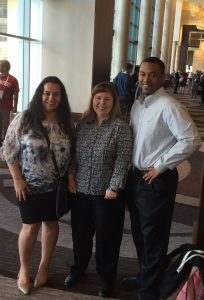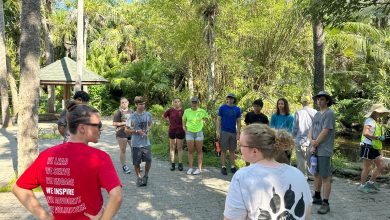Women + Math = STEM Success

Assistant Professor of mathematics, Munevver Mine Subasi, is involved with several interdisciplinary projects where math is applied to real-world problems including medicine (cancer and other human diseases), finance, and engineering. Dr. Subasi has been serving as the research advisor of several graduate students and undergraduate students at Florida Tech. In partnership with Dr. David Carroll from Biological Sciences, they were awarded a National Science Foundation grant for BioMath Research Experience for Undergraduates (REU). Through this unique program, the REU team, consisting of four math faculty and five biology faculty, hosts 10 students for 10 weeks to conduct biomath related research. During the course of the program, students apply sophisticated mathematical methods and biology principles to the topics such as coral reef growth, modeling cancer cell growth, prediction of chronic kidney disease, microorganism motility in complex fluids, automated image analysis systems with applications to biology, and the island adaptation of song sparrows using genomic and bioinformatics tools. Dr. Subasi has also received funding from The Community Foundation of Brevard’s Kenneth R. Finken and Dorothy Hallam Finken Endowment Fund for Breast Cancer Research in 2013 and has participated in a successful NSF REU program on Partial Differential Equations and Dynamical Systems (Principal Investigator: Dr. Ugur Abdulla, Department Head, Mathematical Sciences).
What inspired you to pursue a STEM education and career?
I loved math and my math teachers both at high school and college which motivated me to pursue an academic career as a mathematician. My M.S. thesis advisor, Dr. Naime Ekici (Professor of Mathematics, Cukurova University, TURKEY), who is not only an excellent scientist but also a very confident woman, has been my role model. My love for math and desire for being an academic has been fostered by constant support from my research mentor, Dr. Yusuf Unlu (Cukurova University, TURKEY, Dr. Andras Prekopa (Rutgers University, NJ), Dr. Peter L. Hammer (Rutgers University, NJ), Dr. Endre Boros (Rutgers University, NJ), and Dr. Gyan Bhanot (Rutgers University, NJ).
What do think are some of the most shared/common challenges women in STEM fields encounter?
The common public opinion about women not being good at STEM fields discourages female students starting at a very young age and continues throughout their life. There shouldn’t be any comparison of genders in STEM fields or any part of the daily life. Anyone who wants to do it by heart can do much more than he/she could imagine. Every woman should be aware of her attributes of a woman (being organized, focused, courageous, and many more) so that she can set her limits very high and achieve any goal.
How have you overcome obstacles/challenges as a woman in STEM?
Not really. I have always had support from both female and male research mentors during my academic training and from colleagues and bosses as a faculty member in the Department of Mathematical Sciences. Being confident about what you are doing and making others feel your self-esteem helps to get respect. Of course, there are some unfortunate exceptions which we hear or read about.
Knowing what you know now, what advice you would give your younger self?
I am a mathematician. Math can be a nightmare for many people regardless of the community they belong to. Math is not easy. It is very challenging, but this part of what makes it exciting and fun. My advice is not to give up. You will definitely discover your love and passion for math if you keep trying and seeking for help when needed. Let me share with you what I have learned from my experience teaching various math classes for several years; female students are very good in math!!
What one takeaway would you want to impart on a young woman thinking of pursuing an education/career in STEM?
It’s is challenging, it is fun, and you can do it!
What is an aspect of being a woman in STEM you were surprised to discover?
Nothing specific, but I get credit for “being very smart” when I say what I do for living. My reply back such comments is “No, I just love math and that makes me be good at math”.
In your experience, what are the top things leaders could do to encourage more young women to enter STEM fields?
Avoid making gender specific comments. The worst thing that can happen to someone is to be told that she (or he) is not good at something because she (or he) is a woman (or man). A woman (man) cannot and doesn’t have to act or think like a man (woman). However, this doesn’t mean that she (or he) cannot be good at anything specific. Those skills are earned through training both academic and non-academic. Have women be more involved and give them the equal opportunity. You will see how things get done and get done well when a woman is involved!





